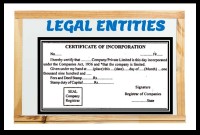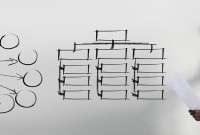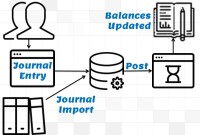- Home
- Business Processes
- Industry Knowledge
- Aerospace Industry
- Automotive Industry
- Banking Domain
- BFSI Industry
- Consumer/ FMCG Industry
- Chemicals Industry
- Engineering & Construction
- Energy Industry
- Education Domain
- Finance Domain
- Hospitality Domain
- Healthcare Industry
- Insurance Domain
- Retail Industry
- Travel and Tourism Domain
- Telecom Industry
- Leadership Skills
- eLearning
- Home
- Functional
- General Ledger (Record to Report)
- GL - Unearned / Deferred Revenue
GL - Unearned / Deferred Revenue
Unearned revenue is a liability to the entity until the revenue is earned. Learn the concept of unearned revenue, also known as deferred revenue. Gain an understanding of business scenarios in which organizations need to park their receipts as unearned. Look at some real-life examples and understand the accounting treatment for unearned revenue. Finally, look at how the concept is treated in the ERPs or automated systems.
What is unearned revenue?
Unearned revenues sometimes referred to as deferred revenues, are items that have been initially recorded as liabilities but are expected to become revenues over time or through the normal operations of the business. Unearned revenues (or deferred revenues) are revenues received in cash and recorded as liabilities prior to being earned. Unearned revenue is a liability to the entity until the revenue is earned.
Prepaid expenses and unearned revenues are created from transactions that involve the receipt or payment of cash. In both cases, the recording of the related expense or revenue is delayed until the end of the period or to a future accounting period as per accounting prudence and matching and accrual principles. It results from the company's receiving payments in advance for services or products that have not yet been provided. The company now ''owes'' that amount of services or products to its customer. This '' debt'' will be satisfied when those services or products are provided.
Examples of Unearned Revenue:
Some examples of unearned revenue are unearned rent, tuition received in advance by a school, an annual retainer fee received by an attorney, premiums received in advance by an insurance company, and magazine subscriptions received in advance by a publisher. Another example of unearned revenue would be if the customer paid a deposit for a custom ordered machine that has not been delivered, the deposit would be recorded as unearned revenue. A magazine subscription results in deferred revenue for the publisher because the payment is received in advance; it will be converted into actual revenue as issues of the magazine are delivered.
An airline that receives advance payment for tickets should also record the transactions as unearned revenue. Similarly, professional service providers such as accounting, legal, and contracting firms that accept deposits should record them as unearned revenue. Companies that provide warranties to their customers for an extended time period and charge for these warranties also deal with unearned incomes.
Accounting Treatment of Deferred Revenue:
Companies using the accrual accounting method should adhere to the revenue recognition principles and matching principles. Companies should recognize revenue only in the same accounting period in which it is earned. Consequently, when companies accept deposits or advance payments, they should record them as unearned revenues at the time of the receipt. Then, in the future when the goods or services are provided to the customers, they should adjust the entries as earned income.
Unearned revenue is treated as a short- or long-term (or both) liability on a company's balance sheet, based on the nature of the entry and underlying business contract. This type of adjusting entry will be adjusted by another entry as and when the revenue will be earned to recognize revenue and offset the deferred revenue.
Examples of industries having unearned revenue:
Unearned revenue can be applied in almost all industries however it becomes very important in the case of some industries where advance payments are the norm like subscriptions for magazines. Companies providing extended warranties need to treat their sales as unearned revenues at the time of sale.
Industries dealing in products that require installation services are accounted for as multiple-element arrangements, where the fair value of the installation service is deferred when the product is delivered and recognized when the installation is complete. For installations with customer acceptance provisions, all revenue is generally deferred until customer acceptance.
Warranty billings are generally invoiced to the customer at the beginning of the contract term. Revenue from extended warranties is deferred and recognized ratably over the duration of the contract. When a dealer sells (sells being the keyword) a service contract not all of the revenue is recognized at the time of sale. Instead, it is recognized over the life of the contract and recorded as Deferred Service Contract Revenue in the liability section of the balance sheet. Each month and or year a portion of the deferred revenue is moved from liabilities to income. Unearned extended warranty revenue is reflected as unearned revenues in accrued liabilities in the balance sheets.
Revenue from separately priced, self-insured service contracts is deferred at the point of sale and generally recognized on a straight-line basis over the life of the contract for GAAP presentation.
Accounting Entries for Unearned Revenue:
In automated systems, you can define rules that can determine the event which triggers the revenue recognition. Till the time that recognition event is triggered, the amount remains parked in an unearned revenue account as a liability. If you enter an invoice with a Bill in Advance invoicing rule, Receivables creates the following journal entries.
In the first period of the rule:
Debit: Receivables
Credit: Unearned Revenue
In all periods of the rule for the portion that is recognized:
Debit: Unearned Revenue
Credit: Revenue
Related Links
You May Also Like
-
Introduction to Legal Entities Concept
Modern business organizations operate globally and leverage a large number of registered legal entities, and operate through complex matrix relationships. To stay competitive in the current global business environment, they must often develop highly diverse and complex organizational structures that cross international borders. Learn more about Legal Entities and their importance for businesses.
-
The purpose of the general ledger is to sort transaction information into meaningful categories and charts of accounts. The general ledger sorts information from the general journal and converts them into account balances and this process converts data into information, necessary to prepare financial statements. This article explains what a general ledger is and some of its major functionalities.
-
Trial Balance in General Ledger
One of the greatest benefits of using a double-entry accounting system is the capability to generate a trial balance. What do we mean by trial balance? As the name suggests a trial balance is a report that must have its debits equals to credits. Understand the importance of trial balance and why it is balanced. Learn how it is prepared and in which format.
-
Team-Based Organizational Structure
Team-based structure is a relatively new structure that opposes the traditional hierarchical structure and it slowly gaining acceptance in the corporate world. In such a structure, employees come together as team in order to fulfill their tasks that serve a common goal.
-
An account inquiry is a review of any type of financial account, whether it be a depository account or a credit account. In this tutorial, you learn what we mean by drill through functionality in the context of the general ledger system. We will explain the concept of drill-down and how it enables users to perform account and transaction inquiry at a granular level and the benefits of using this functionality.
-
In this article we will discuss various types of "Management Entities". Various types of operational units, are created by management, to effectively run, manage and control their business. Different types of functional units, and divisional units, are widely used across industry.
-
Five Core General Ledger Accounts
Typically, the accounts of the general ledger are sorted into five categories within a chart of accounts. Double-entry accounting uses five and only five account types to record all the transactions that can possibly be recorded in any accounting system. These five accounts are the basis for any accounting system, whether it is a manual or an automated accounting system. These five categories are assets, liabilities, owner's equity, revenue, and expenses.
-
McKinsey 7S Framework is most often used as an organizational analysis tool to assess and monitor changes in the internal situation of an organization. The model is based on the theory that, for an organization to perform well, seven elements need to be aligned and mutually reinforcing.
-
Generally Accepted Accounting Principles define the accounting procedures, and understanding them is essential to producing accurate and meaningful records. In this article we emphasize on accounting principles and concepts so that the learner can understand the “why” of accounting which will help you gain an understanding of the full significance of accounting.
-
GL - Journal Posting and Balances
In this tutorial, we will explain what we mean by the posting process and what are the major differences between the posting process in the manual accounting system compared to the automated accounting systems and ERPs. This article also explains how posting also happens in subsidiary ledgers and subsequently that information is again posted to the general ledger.
Explore Our Free Training Articles or
Sign Up to Start With Our eLearning Courses

About Us
Learning
© 2023 TechnoFunc, All Rights Reserved









